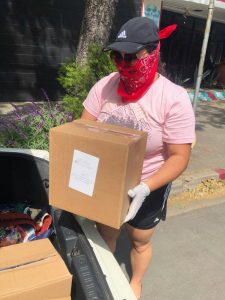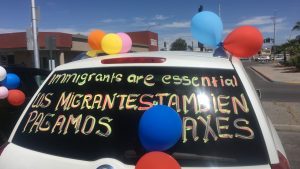by Leslie Layton
Until disaster struck, Susana and her husband were employed by two Chico restaurants, supporting their three children by working in food preparation and dishwashing.

They paid social security and other taxes, but when the restaurants that employed them were closed two months ago as part of the state-mandated shelter-in-place, there was no government relief available for the family.
As undocumented immigrants, they were ineligible for unemployment insurance or a stimulus check. Financial assistance to undocumented immigrants nationwide – many of whom perform services deemed essential, and in doing so, are subject to possible virus exposure – has largely been left to grass-roots, charitable organizations that struggle to keep up with a deluge of requests for help.
The Sacramento-based immigrant aid organization, NorCal Resist, is running a May 16 “Car Caravan” to Butte County to provide assistance to about two dozen immigrant families. Organizer and attorney Autumn Gonzalez said NorCal Resist had to suspend its hotline application process to ensure it could stretch the donations it has received in recent weeks.
Nationally, the new $3-trillion coronavirus relief package proposed by House Democrats would provide checks — for the first time in this pandemic — to undocumented immigrants like Susana who work and pay taxes. But that legislation, known as the HEROES Act, still has to be voted on in the House, and once it passes, Senate Republicans may block its passage.
Susana and her husband are working to achieve legal status with the help of citizen family members, but that process could take years. And undocumented immigrants like Susana avoid use of any safety-net benefit — whether it be Medi-Cal or food stamps — that could jeopardize a green-card application under the Trump administration’s public charge rule.
In the meantime, Susana’s family has eliminated all amenities such as Netflix and exhausted a small savings account on day-to-day needs. Her husband occasionally finds day jobs in construction.
In California, members of this underclass – there are more than 2 million undocumented immigrants in the state — often work in restaurants, agriculture and construction, paying taxes under taxpayer identification numbers that help fund benefits for citizens and legal residents. Yet many of them now find themselves turning to the charity of nonprofits.
“I think probably most have been entirely laid off or have had significant reduction in the hours they work,” Gonzalez said of California’s undocumented population.

Susana agreed to be interviewed by ChicoSol, but her name has been changed because of her undocumented status. Until three years ago, she worked as an administrative assistant in a Peruvian city, but she and her husband were unable to support their family on their salaries. So they journeyed to Northern California to join her husband’s family in Chico.
Now, she says, they’re surviving with the help of meals provided by Chapman Elementary School and the Boys and Girls Club, and with the cooperation of a landlady who has agreed to let them pay parts of their rent late. They have $100 in their bank account; monthly rent for their two-bedroom apartment is $840.
Gonzalez says they’ve received many calls from Butte County from families that have undocumented members and also survived the devastating 2018 Camp Fire. “We’ve heard from people who say, ‘We have no food left and we’re down to our last $10,’” Gonzalez said.
As Butte County begins an early re-opening of its economy, in accordance with state and local guidelines that advise limited services for fewer clientele, Susana worries that local restaurants will need fewer employees.
That concern may be justified, says global migration expert Demetrios Papademetriou, co-founder of the Washington, D.C., Migration Policy Institute.

Advanced economies for years have relied on a supply of immigrant workers, particularly in agriculture, he noted at a recent Ethnic Media Services (EMS) online briefing. But because of policies implemented in response to the pandemic, global migration has “ground to a halt,” he said.
“There has been an elite consensus that has allowed migration to continue to be large and to thrive,” Papademetriou said of developed nations around the world. “We’ll have to see whether that elite consensus continues to hold… a lot of assumptions we have been making as to how many new workers we are going to need are going to be re-examined.”
In other words, the “elite consensus” may break down as countries work to climb out of what Papademetriou calls an “economic abyss” caused by the pandemic.
Some countries, he noted, are making substantial investment in the integration of immigrant communities or considering steps that could give legal status to undocumented residents. But he doesn’t forsee that happening in the United States any time soon.
“Whether we can have an agreement between the two parties in Congress that will then be signed by the president of the United States – this is highly questionable, we all know that,” he said.
In California, meanwhile, there has been an effort to provide a modicum of pandemic assistance by both the state and private foundations.
Last month, Gov. Gavin Newsom announced that California will provide the $75 million Disaster Relief Fund to support undocumented residents who are otherwise ineligible for government aid. The money will be distributed among roughly 150,000 people – about 7 percent of the state’s undocumented population.
While the state fund is what Gonzalez calls “only a little drop in the bucket,” it will be complimented by money from the California Immigrant Resilience Fund that is appealing to foundations and philanthropists for donations.
The network of foundations supporting the Resilience Fund says it has committed to raising $50 million to support the families of California’s undocumented immigrants.
Gonzalez said that so far $13 million has been raised, and distribution of that money may begin in just days. NorCal Resist, which by itself has raised enough money to help more than 600 families in the Sacramento region, is one of 40 organizations that will distribute the private funding.
Gonzalez said she’ll work to ensure that some money gets to Butte County and other rural areas in the state.

Susana, the Chico immigrant, said it’s almost too stressful to think about the future. “I prefer to distract myself with the children,” she said.
But she thinks almost nonstop about how to generate new sources of revenue – about cleaning houses or making crafts or preparing food that she can peddle.
That’s the kind of toughness and resiliency that impresses Dulce Gamboa, a policy specialist for the Washington, D.C.-based Bread for the World, a nonprofit that has been “urging Congress to protect migrant families left out of the economic stimulus package.”
Although her organization would like to see money allocated to a global effort, she says the HEROES Act, on the domestic front, is a step forward. The legislation would establish a “Heroes’ Fund” for hazard pay, provide stimulus checks regardless of immigration status and extend some work visas.
“The Latino community is a resilient community,” Gamboa said. “Most of us are essential workers. We’re on the frontlines, protecting this country with our work every day.”
Leslie Layton is editor of ChicoSol and a freelance journalist.

Get the Latina/o Caucus of the CA Democratic Party on board with the Resilience Fund/HEROES scheme. Lots of well healed members of this fast growing political group.